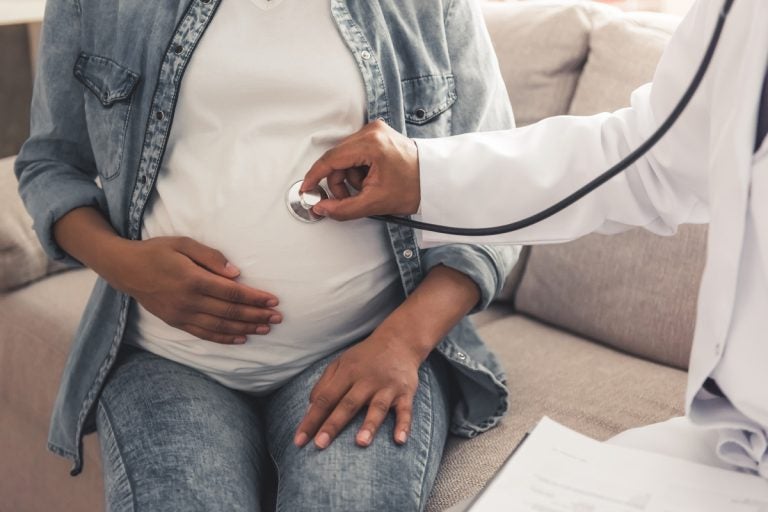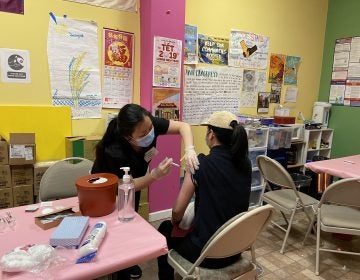‘They were dying after they went home’: Black women in Philly represent 73% of pregnancy-related deaths
Chronic diseases, mental health issues, and health insurance were factors, a review of pregnancy-associated deaths from 2013 to 2018 shows.

A doctor holds a stethoscope on a pregnant person's belly. (VadimGuzhva/Bigstock)
Back in 2010, Philadelphia hospital systems and city agencies started to notice something: Maternal deaths were rising in the city.
The Philadelphia Maternal Mortality Review Committee was founded shortly afterward, with the express purpose of identifying key causes of the city’s higher-than-average maternal mortality rate and providing recommendations for policy and programmatic change in major health systems.
The first in the nation of its kind, Philadelphia’s MMRC reviewed the 110 pregnancy-associated deaths that occurred in the city from 2013 to 2018. Though the people in this study self-identified as women, the city acknowledges that not all pregnant people identify that way, and transgender and nonbinary birthing people face unique barriers in accessing quality health care.
Of the total maternal deaths, more than a quarter were pregnancy-related — meaning deaths caused specifically by pregnancy itself or its management. And, Dr. Aasta Mehta says, one thing became clear: Women in Philadelphia were not dying in childbirth.
“They were dying after they went home,” said Mehta, medical officer of women’s health at the Philadelphia Department of Public Health and director of the Philadelphia Maternal Mortality Program.
In addition, according to a recent report from the Philadelphia MMRC, Black women in the city made up 43% of births, but 73% of pregnancy-related deaths. These striking racial disparities in maternal health are not new, Mehta said, and demand attention to underlying issues such as physician bias and systemic racism.
“Black women are about four times more likely to die than white women of a pregnancy-related death,” said Mehta. “And so this is even [true] across all causes of pregnancy-related deaths. A lot of the reason we see these disparities is the same reason we see disparities in all other causes: systemic factors [and] social determinants of health.”
Chronic diseases that increase the risk of maternal mortality are more prevalent and treated at later stages in Black women. And gaps in health care coverage and preventive care have also been identified as contributors to pregnancy-related deaths.

Thirty-two percent of all pregnancy-associated deaths in Philadelphia across racial groups occurred in women who started prenatal care late or not at all. Mehta said prenatal care is generally covered by health insurance. But 15% of women who experienced pregnancy-related deaths didn’t have insurance during their pregnancy.
“Access to insurance [is] a critical piece in overall good health,” said Mehta. “And you may recognize some morbidities during pregnancy. If patients need a follow-up and things like that, they may not be able to get it because they’ve lost their health insurance.”
The report also noted that close to 60% of individuals with pregnancy-related deaths had Medicaid coverage at the time of pregnancy. Currently, women with Medicaid lose postpartum coverage 60 days after delivery. In Pennsylvania, close to 25% of Black people are enrolled in Medicaid, highlighting the need to prevent gaps in coverage that may contribute to further maternal death disparities.
Ultimately, Mehta said, health care providers and health systems really need to think more about the entire life cycle of birthing — before, during, and after pregnancy.
“Pregnancy is still a part of this overall life course of people and their health,” said Mehta. “And it could be an opportunity to optimize a lot of these potential chronic conditions that women and birthing people can use … to jump-start or to continue having better health long term.”
Majority of pregnancy-related deaths happened after delivery
Typically, those who are expecting interact with doctors and health care systems frequently both before and during pregnancy. But after the baby is delivered, Mehta said, it’s common to see that engagement with health systems diminish.
“You’re not going to see your doctor as much,” said Mehta. “And a lot of other priorities pop up, [so] you may not necessarily recognize early warning signs of something that could be going on with your body.”
That also means necessary health care gets delayed, ultimately contributing to worsened health outcomes.
Almost half of pregnancy-related deaths in Philadelphia were due to cardiomyopathies or other cardiovascular conditions; 23% were due to embolisms, or obstruction of an artery, typically by a blood clot; and 8% were due to hemorrhages from a broken blood vessel.
“Hemorrhages are not as common in Philadelphia as they are in other parts of the state and country,” Mehta noted. “And that is a direct result of all the safety practices that Philadelphia hospitals have put into play.”
Drug-related deaths on the rise in pregnant individuals
Accidental opioid-related deaths have risen in Philadelphia in recent years, making the city one of several epicenters of the nation’s opioid epidemic. As a result, drug overdoses have also increased among pregnant and postpartum individuals in the city.
Between 2009 and 2016, accidental drug overdoses accounted for 25% of pregnancy-associated deaths. According to Philadelphia’s MMRC report, that increased to 39% between 2017 and 2018. Mehta said preliminary data from 2019 and early 2020 suggests that the upward trend is persisting.
“This population is not immune to drug overdoses, similarly to the general population,” said Mehta. “It’s also important to consider this special population may need extra help, especially given what we know about hormonal changes that can cause postpartum depression. And what that can do to their mental health and their substance use.”
From 2013 to 2018, white women of childbearing age were over 2.5 times more likely to die from accidental drug overdoses in Philadelphia than non-Hispanic Black women of the same age bracket.
“We have a lot of drug-related deaths that are occurring in this long time period after pregnancy,” said Mehta. “And that is related to coexisting mental and behavioral health issues.”
Forty-five percent of the pregnancy-associated deaths across all racial groups had a history of mental health issues, and close to 60% had a history of substance use.
Philadelphia’s MMRC noted that there is a lack of mental and substance use programs in the city that are easily accessible, trauma-informed, and gender-specific. Nor do they meet the particular needs of those who are pregnant. Mehta and her colleagues recommend screening for substance use at the initial prenatal visit and delivery, and creating standardized protocols to facilitate referral for pain management and medication-assisted treatment.
Since the Philadelphia MMRC’s first maternal death report in 2015, several initiatives meant to address the issue have emerged, including the creation of a centralized referral system for home visiting services, a prenatal lab-sharing agreement to facilitate health information exchange between all delivery hospitals, and a citywide educational program focused on screening and referral to treatment for substance use in pregnancy.
Metha said she and her colleagues at the city’s Health Department want to work collaboratively across hospital systems and city social services to begin addressing the issue of maternal mortality.
“We at the Health Department are releasing this data, and our goal is for people in the community to know what’s going on and be sort of emboldened to do something about it,” said Mehta. “We are actively engaged and really want to move this needle.”
—
Support for WHYY’s coverage on health equity issues comes from the Commonwealth Fund.

Get daily updates from WHYY News!
WHYY is your source for fact-based, in-depth journalism and information. As a nonprofit organization, we rely on financial support from readers like you. Please give today.







